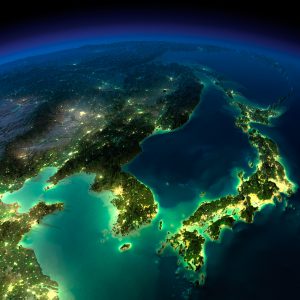South Korea was one of four countries, along with Australia, India, and South Africa, invited to observe the recent G-7 meeting in Cornwall. Australia and India’s historical links with the U.K. and close relations with the U.S. and Japan no doubt secured their invitations. South Korea’s inclusion in the meeting makes sense given that it is a fellow democracy, U.S. treaty ally, and consequential player in the Indo-Pacific. More fundamentally however, the invitation to President Moon Jae-in seeks to draw Seoul out from the Korean Peninsula and encourage it to play a more active role in promoting shared liberal and democratic interests in the Indo-Pacific.
However, so far, Seoul seems unwilling to play a greater leadership role and actively shape the regional order.
Consider South Korea’s current foreign policy. In 2017, Moon launched his New Southern Policy (NSP), which was later rebranded to the New Southern Policy Plus. The policy focuses on deepening bilateral relations with India and the ASEAN nations – but does not consider the region as a whole and falls short of looking as far south as Australia. This neglects Seoul’s capacity for broader regional shaping and misses the opportunity to enhance relations with other key regional players, such as Australia, Japan, and Taiwan. The NSP has also been unevenly executed, focusing predominantly on economic relations over security.
The NSP is designed around three pillars: people, prosperity, and peace. By far, most effort has been invested in the prosperity pillar. This pillar aims to diversify South Korea’s trade partners and increase commercial opportunities for Korean companies in Southeast Asia and India. Much less progress has been made against the “peace” pillar. This pillar includes expanding defense cooperation, developing a collective response to challenges in the cyber and maritime domains, and building regional resilience. A lack of action on defense and security cooperation, along with the policy’s narrow South and Southeast Asia focus, may partly explain why there is low confidence in Seoul providing leadership in support of a rules-based order in the Indo-Pacific.
Another reflection of Seoul’s aversion to assuming a greater regional leadership and security role is its hesitation to adopt the “Indo-Pacific” concept as an organizing framework.
The term “Indo-Pacific” and its oft-accompanying motto, “free, open, inclusive, and rules-based,” were developed and promoted by the United States, Japan, and Australia. As a result of the phrases’ origins, there is a perception in South Korea and elsewhere that the concept is inherently anti-China. Where Australia, Japan, the United States, and India all champion the concept and ASEAN and European countries have adopted the language in their strategic documents, South Korea is an outlier.
Seoul recognizes that embracing the term is provocative to China and, regardless, is preoccupied with Northeast Asia dynamics. As Jaehyon Lee explains:
Traditionally, the Korean Peninsula and ‘bilateral’ relations with the four major powers dominated the discourse and security debate in South Korea. Very little room was spared for wider regional strategic and security issues such as an emerging new regional order or the concept of a new region.
Failure to engage with the Indo-Pacific concept and regional security is at odds with South Korea’s high level of engagement and activity in global fora, as well as its status as the region’s fourth largest economy, its fifth largest military, and fifth largest source of soft power. Rather than adopt the concept and develop its own Indo-Pacific strategy as its partners have done, Seoul is forfeiting the chance to have a greater say over the regional security order.
Moreover, recent foreign policy discourse in South Korea has tended toward regional retreat and self-reliance. As Dr. Jeffrey Robertson of Yonsei University recently wrote, in South Korea, “Debates once on the fringe, such as abandoning the U.S. alliance, acceding to China’s dominance, declaring a position of neutrality, and securing an independent nuclear weapons capacity are now mainstream.” While it is true that parallel debates have been occurring within other U.S. allies in the region on the future utility of the U.S. alliance and the cost-benefit calculus of China policy, the comparison in responses is stark.
While South Korea has sought to hedge through strategic ambiguity between the United States and China, Australia has recommitted to its U.S. alliance, enhanced security cooperation with Japan and India, and opposed China.
Understandably, South Korea’s foreign policy will prioritize relations with its immediate neighbors, and the New Southern Policy’s goal of diversifying foreign and trade relations is a positive step. But Seoul’s security policy is underdone, muted, and not commensurate with South Korea’s status.
An ambitious foreign policy that capitalizes on South Korea’s influence and shapes the region is one that broadens effort from economic diversification to security cooperation encompassing the whole Indo-Pacific – and one that not only accepts but embraces the Indo-Pacific concept. South Korea also will need a government and society that allows free debate but is more vocal and active in supporting collective goods like freedom from coercion and adhering to rules-based behavior – the types of values South Korea’s G-7 hosts championed in Cornwall.
South Korea has a much larger capacity for regional security contribution and, by extension, leadership, than it is currently exerting.

































